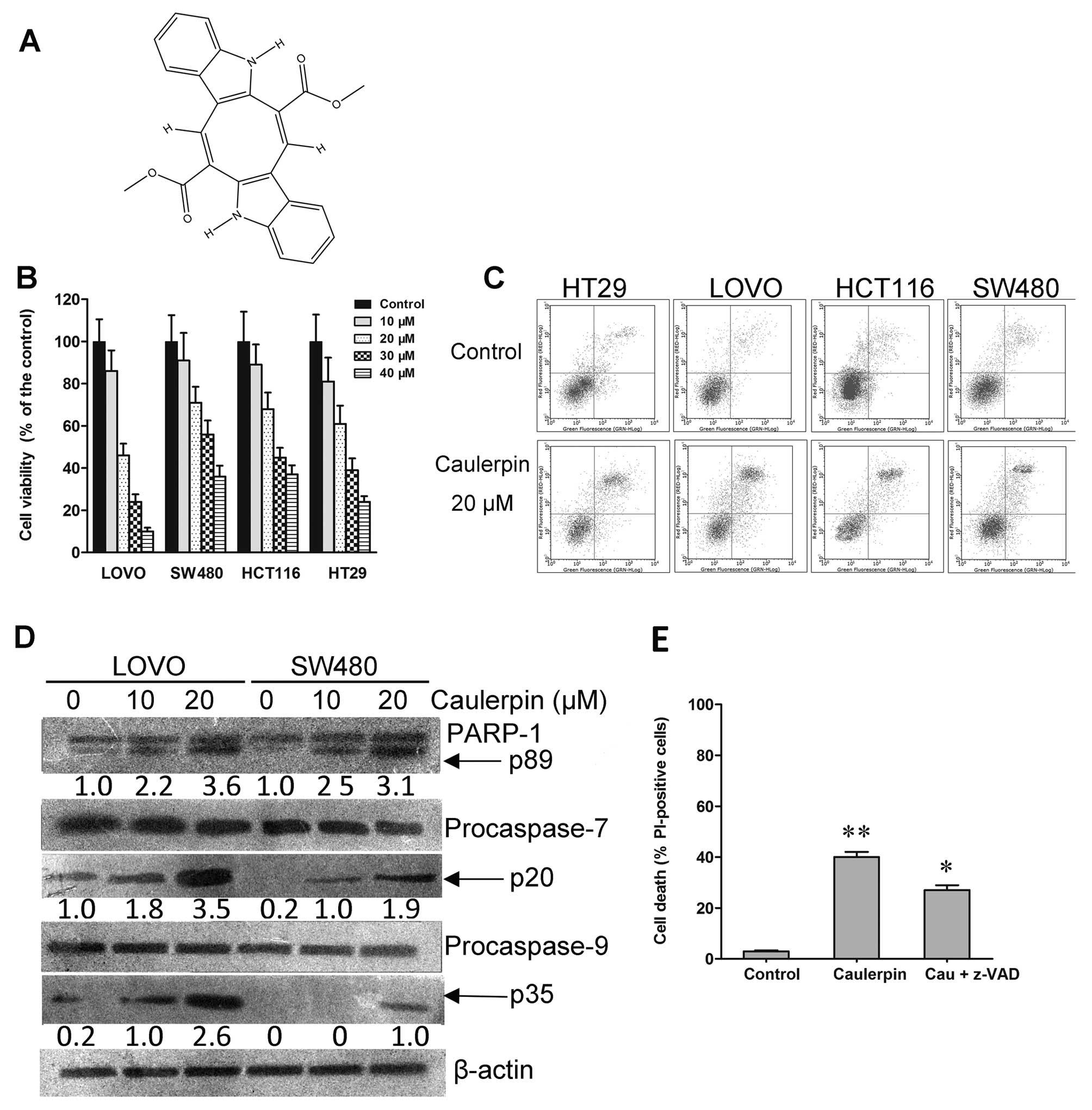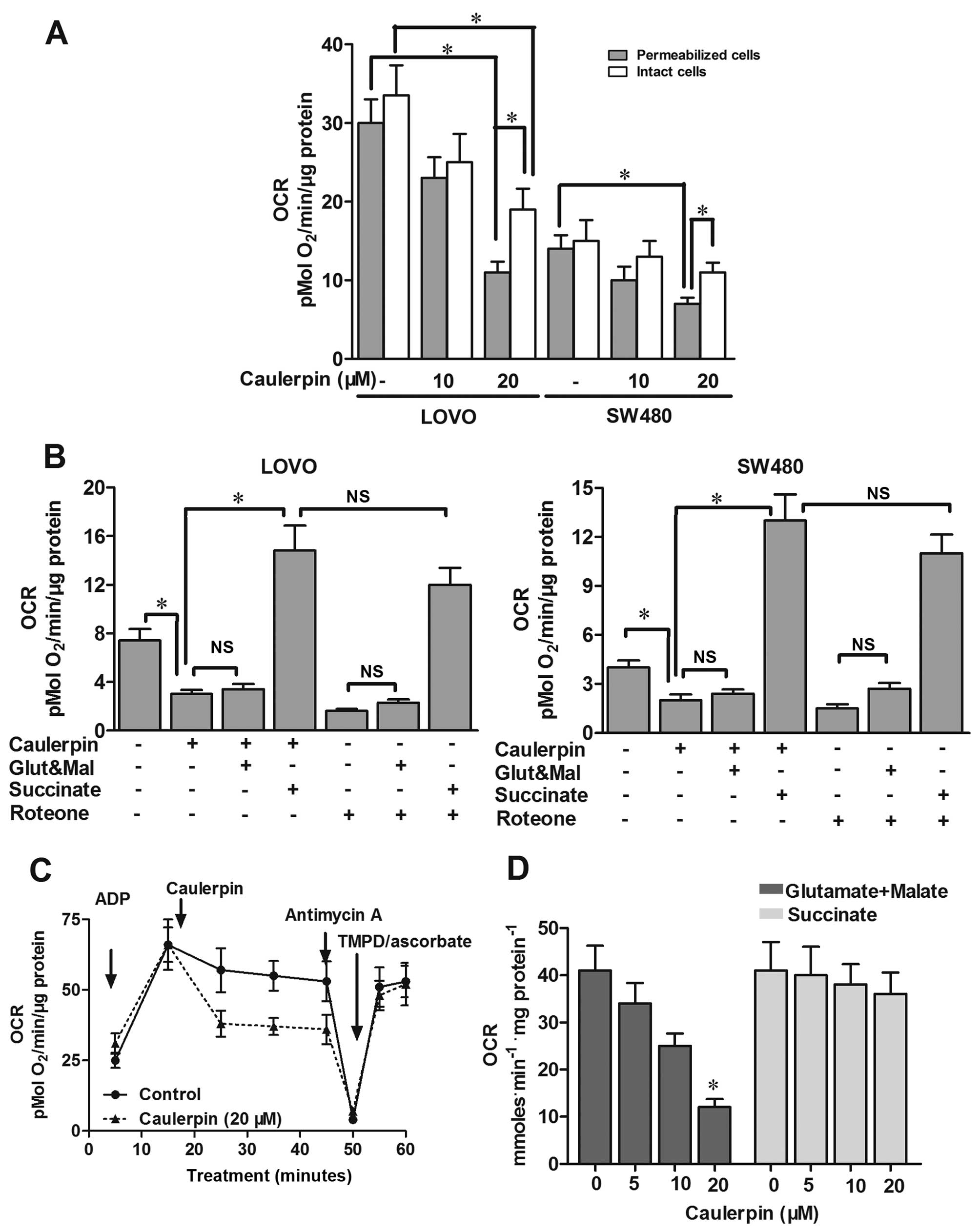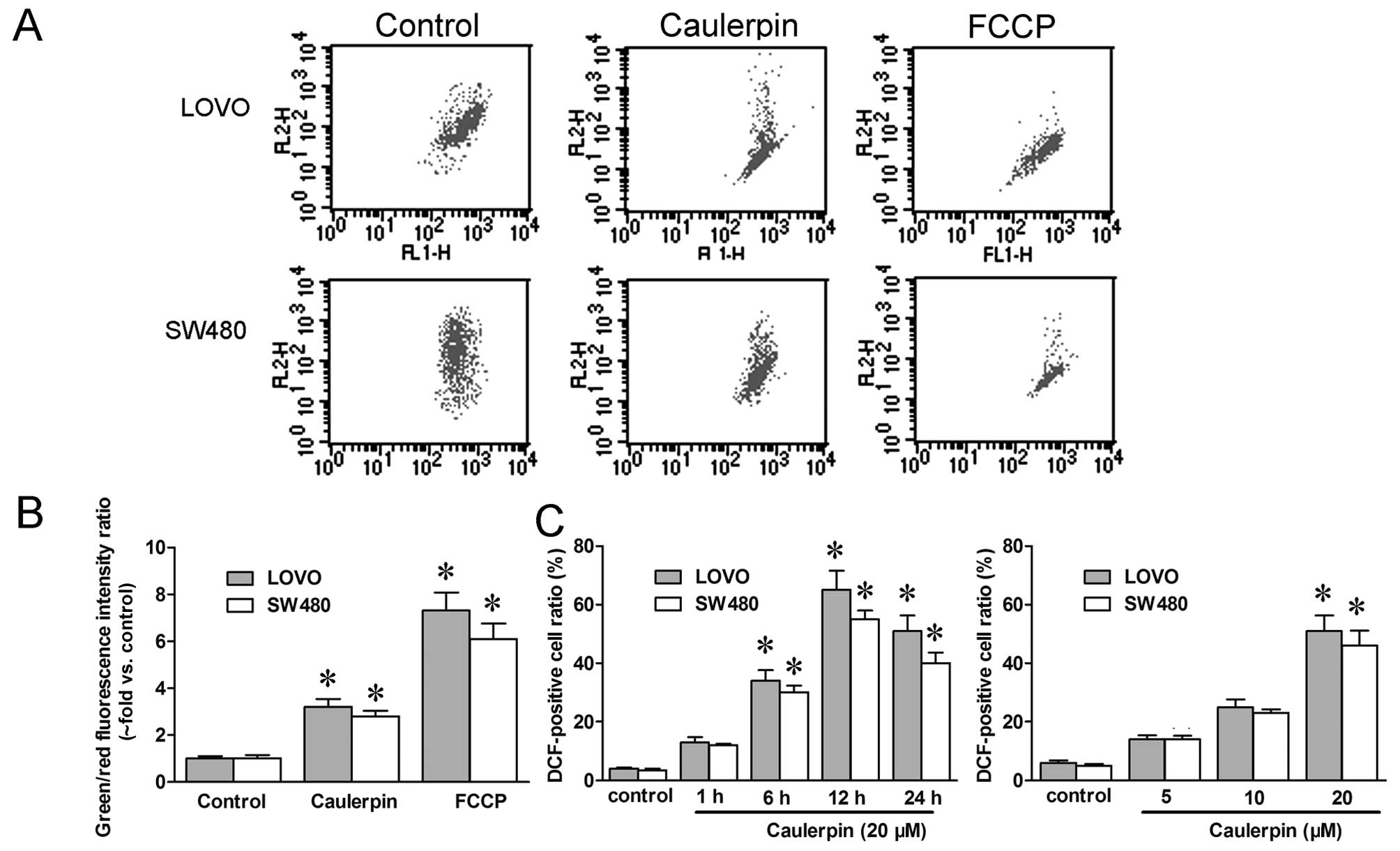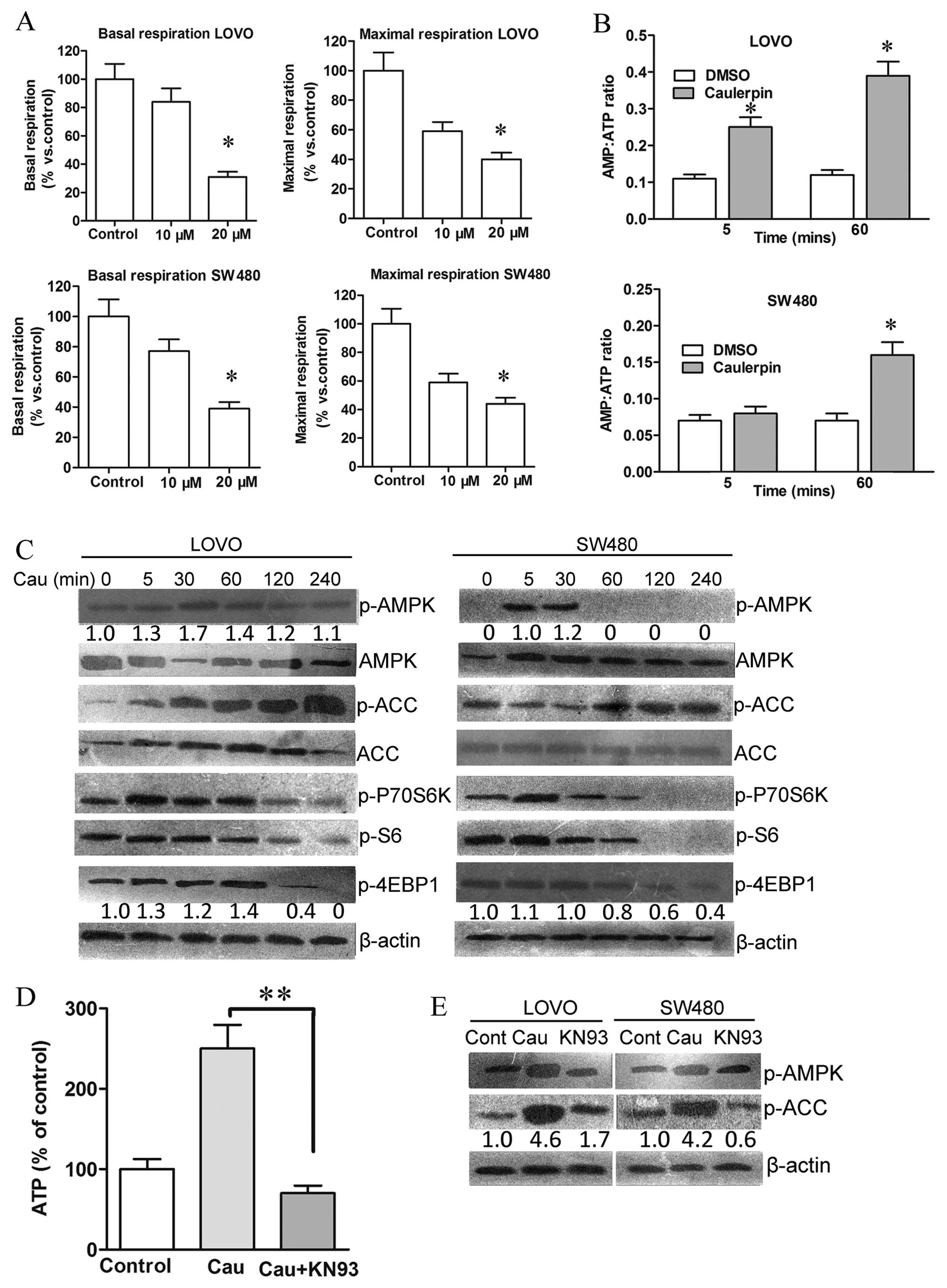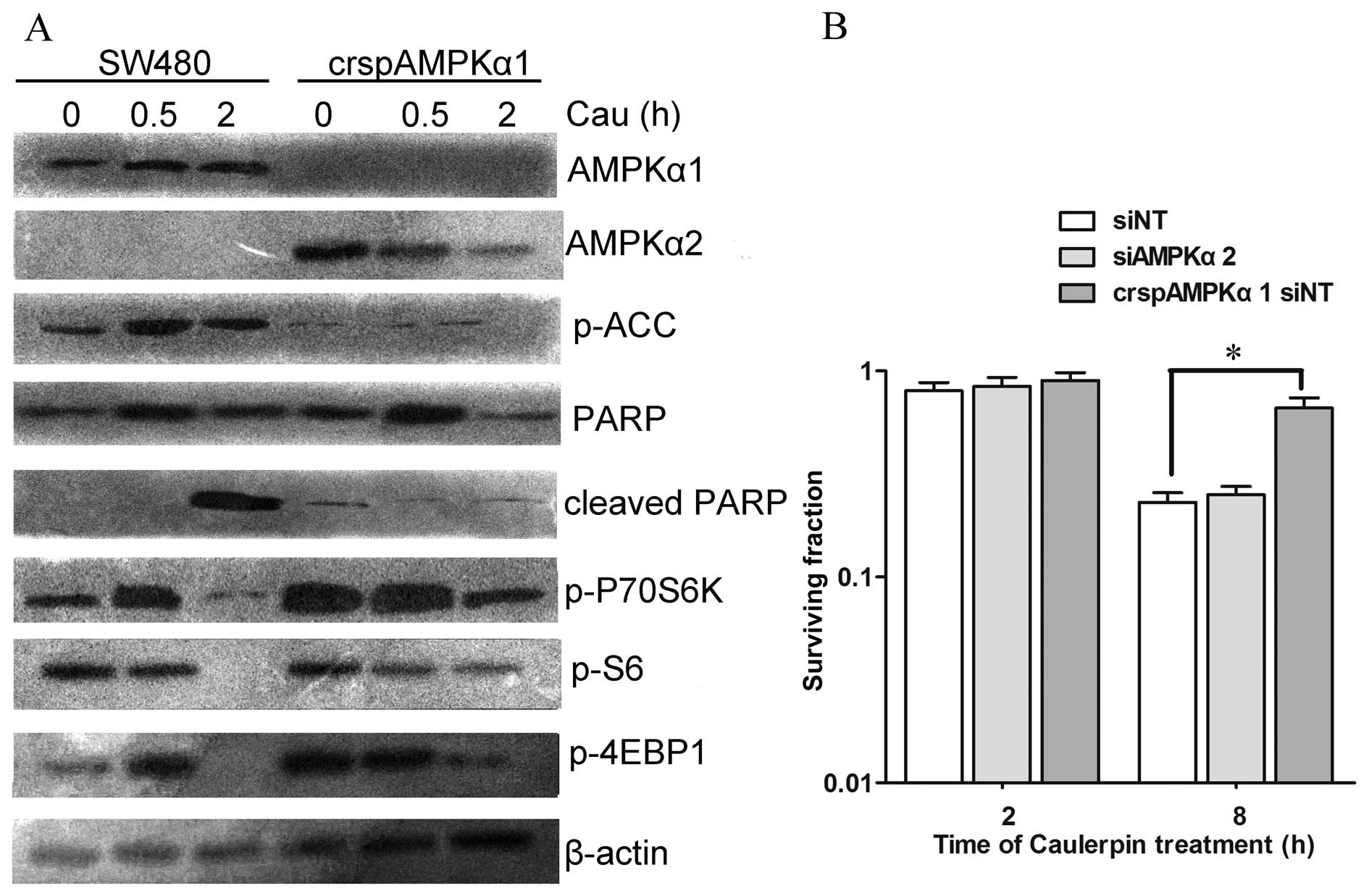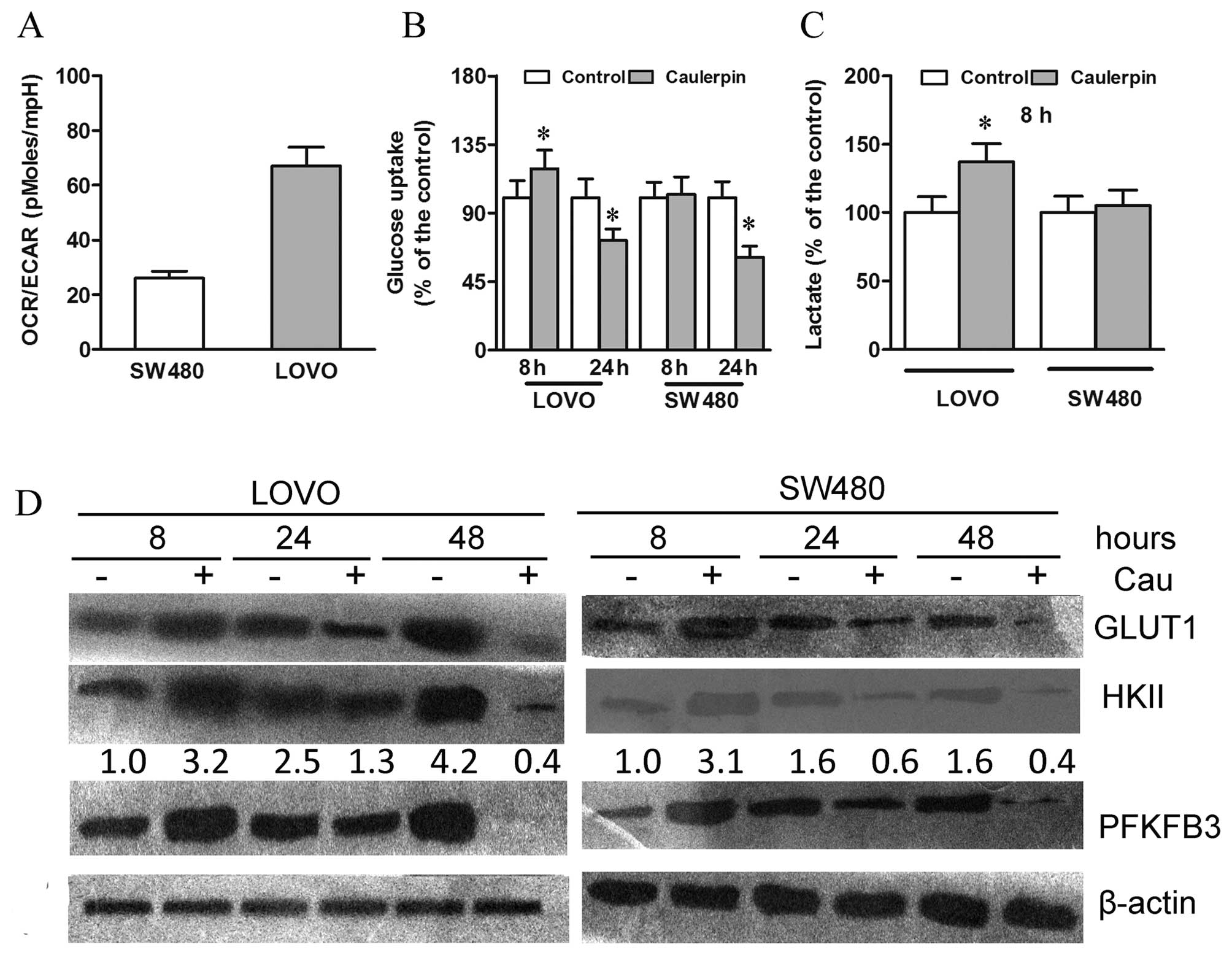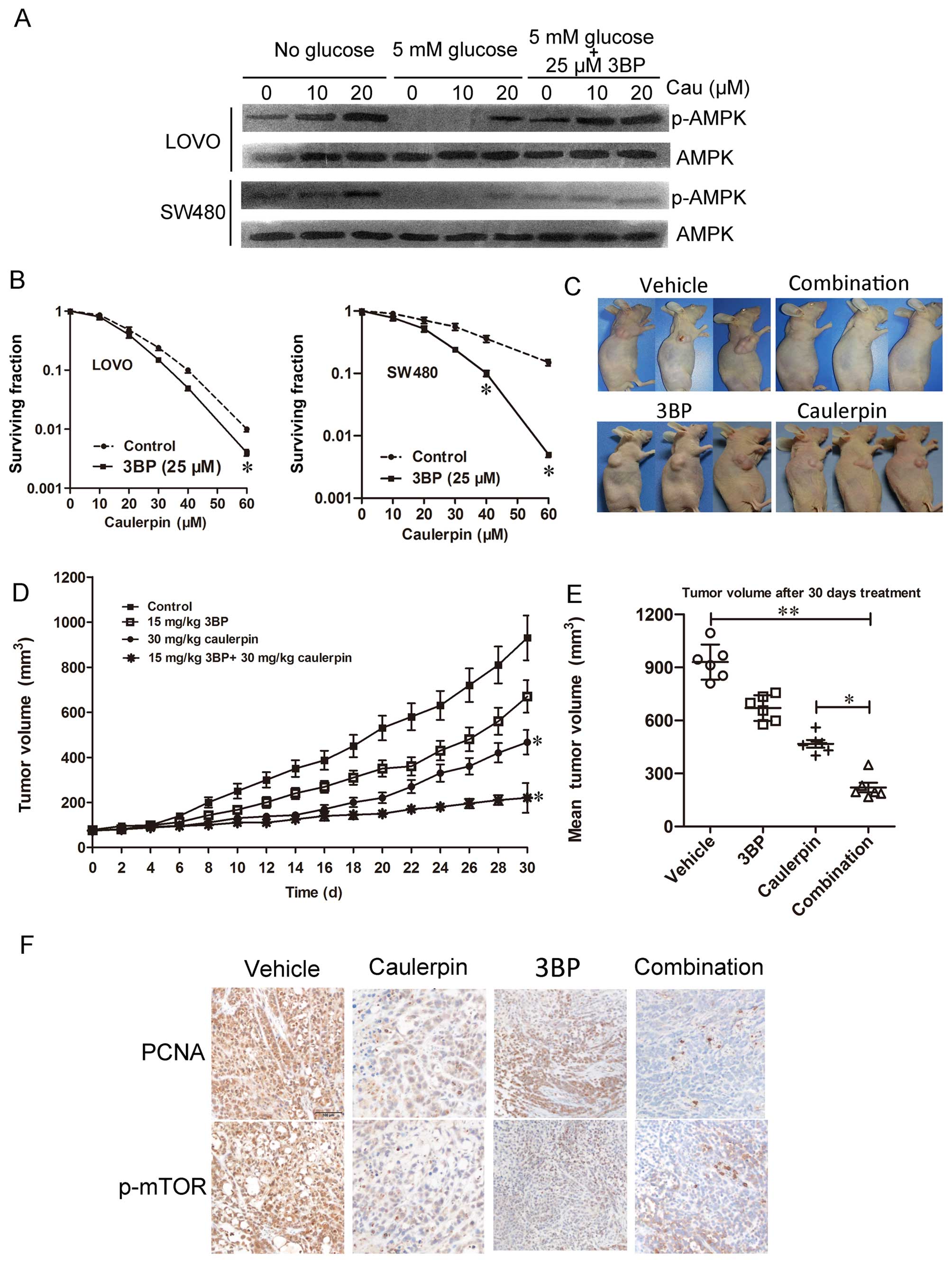|
1
|
Siegel R, Desantis C and Jemal A:
Colorectal cancer statistics, 2014. CA Cancer J Clin. 64:104–117.
2014. View Article : Google Scholar : PubMed/NCBI
|
|
2
|
Warburg O, Wind F and Negelein E: The
metabolism of tumors in the body. J Gen Physiol. 8:519–530. 1927.
View Article : Google Scholar : PubMed/NCBI
|
|
3
|
Ward PS and Thompson CB: Metabolic
reprogramming: A cancer hallmark even Warburg did not anticipate.
Cancer Cell. 21:297–308. 2012. View Article : Google Scholar : PubMed/NCBI
|
|
4
|
Wheaton WW, Weinberg SE, Hamanaka RB,
Soberanes S, Sullivan LB, Anso E, Glasauer A, Dufour E, Mutlu GM,
Budigner GS, et al: Metformin inhibits mitochondrial complex I of
cancer cells to reduce tumorigenesis. eLife. 3:e022422014.
View Article : Google Scholar : PubMed/NCBI
|
|
5
|
Inoki K, Kim J and Guan KL: AMPK and mTOR
in cellular energy homeostasis and drug targets. Annu Rev Pharmacol
Toxicol. 52:381–400. 2012. View Article : Google Scholar
|
|
6
|
Sinha RA, Singh BK, Zhou J, Wu Y, Farah
BL, Ohba K, Lesmana R, Gooding J, Bay BH and Yen PM: Thyroid
hormone induction of mitochondrial activity is coupled to mitophagy
via ROS-AMPK-ULK1 signaling. Autophagy. 11:1341–1357. 2015.
View Article : Google Scholar : PubMed/NCBI
|
|
7
|
Wu XB, Liu Y, Wang GH, Xu X, Cai Y, Wang
HY, Li YQ, Meng HF, Dai F and Jin JD: Mesenchymal stem cells
promote colorectal cancer progression through AMPK/mTOR-mediated
NF-κB activation. Sci Rep. 6:214202016. View Article : Google Scholar
|
|
8
|
Zhang YJ, Dai Q, Sun DF, Xiong H, Tian XQ,
Gao FH, Xu MH, Chen GQ, Han ZG and Fang JY: mTOR signaling pathway
is a target for the treatment of colorectal cancer. Ann Surg Oncol.
16:2617–2628. 2009. View Article : Google Scholar : PubMed/NCBI
|
|
9
|
He X, Lin X, Cai M, Zheng X, Lian L, Fan
D, Wu X, Lan P and Wang J: Overexpression of Hexokinase 1 as a poor
prognosticator in human colorectal cancer. Tumour Biol.
37:3887–3895. 2016. View Article : Google Scholar
|
|
10
|
Hamabe A, Yamamoto H, Konno M, Uemura M,
Nishimura J, Hata T, Takemasa I, Mizushima T, Nishida N, Kawamoto
K, et al: Combined evaluation of hexokinase 2 and phosphorylated
pyruvate dehydrogenase-E1α in invasive front lesions of colorectal
tumors predicts cancer metabolism and patient prognosis. Cancer
Sci. 105:1100–1108. 2014. View Article : Google Scholar : PubMed/NCBI
|
|
11
|
Gandham SK, Talekar M, Singh A and Amiji
MM: Inhibition of hexokinase-2 with targeted liposomal
3-bromopyruvate in an ovarian tumor spheroid model of aerobic
glycolysis. Int J Nanomedicine. 10:4405–4423. 2015.PubMed/NCBI
|
|
12
|
Xintaropoulou C, Ward C, Wise A, Marston
H, Turnbull A and Langdon SP: A comparative analysis of inhibitors
of the glycolysis pathway in breast and ovarian cancer cell line
models. Oncotarget. 6:25677–25695. 2015. View Article : Google Scholar : PubMed/NCBI
|
|
13
|
Liu Y, Morgan JB, Coothankandaswamy V, Liu
R, Jekabsons MB, Mahdi F, Nagle DG and Zhou YD: The Caulerpa
pigment caulerpin inhibits HIF-1 activation and mitochondrial
respiration. J Nat Prod. 72:2104–2109. 2009. View Article : Google Scholar : PubMed/NCBI
|
|
14
|
Ferramosca A, Conte A, Guerra F, Felline
S, Rimoli MG, Mollo E, Zara V and Terlizzi A: Metabolites from
invasive pests inhibit mitochondrial complex II: A potential
strategy for the treatment of human ovarian carcinoma? Biochem
Biophys Res Commun. 473:1133–1138. 2016. View Article : Google Scholar : PubMed/NCBI
|
|
15
|
Graham NA, Tahmasian M, Kohli B,
Komisopoulou E, Zhu M, Vivanco I, Teitell MA, Wu H, Ribas A, Lo RS,
et al: Glucose deprivation activates a metabolic and signaling
amplification loop leading to cell death. Mol Syst Biol. 8:5892012.
View Article : Google Scholar : PubMed/NCBI
|
|
16
|
Priebe A, Tan L, Wahl H, Kueck A, He G,
Kwok R, Opipari A and Liu JR: Glucose deprivation activates AMPK
and induces cell death through modulation of Akt in ovarian cancer
cells. Gynecol Oncol. 122:389–395. 2011. View Article : Google Scholar : PubMed/NCBI
|
|
17
|
Chen Y, Qing W, Sun M, Lv L, Guo D and
Jiang Y: Melatonin protects hepatocytes against bile acid-induced
mitochondrial oxidative stress via the AMPK-SIRT3-SOD2 pathway.
Free Radic Res. 49:1275–1284. 2015. View Article : Google Scholar : PubMed/NCBI
|
|
18
|
Wang SY, Wei YH, Shieh DB, Lin LL, Cheng
SP, Wang PW and Chuang JH: 2-Deoxy-d-Glucose can complement
doxorubicin and sorafenib to suppress the growth of papillary
thyroid carcinoma cells. PLoS One. 10:e01309592015. View Article : Google Scholar : PubMed/NCBI
|
|
19
|
Wei L, Zhou Y, Dai Q, Qiao C, Zhao L, Hui
H, Lu N and Guo QL: Oroxylin A induces dissociation of hexokinase
II from the mitochondria and inhibits glycolysis by SIRT3-mediated
deacetylation of cyclophilin D in breast carcinoma. Cell Death Dis.
4:e6012013. View Article : Google Scholar : PubMed/NCBI
|
|
20
|
Jeong SM, Lee J, Finley LW, Schmidt PJ,
Fleming MD and Haigis MC: SIRT3 regulates cellular iron metabolism
and cancer growth by repressing iron regulatory protein 1.
Oncogene. 34:2115–2124. 2015. View Article : Google Scholar
|
|
21
|
Song J, Feng L, Zhong R, Xia Z, Zhang L,
Cui L, Yan H, Jia X and Zhang Z: Icariside II inhibits the EMT of
NSCLC cells in inflammatory microenvironment via down-regulation of
Akt/NF-κB signaling pathway. Mol Carcinog. Feb 9–2016.Epub ahead of
print.
|
|
22
|
Liu Y, Veena CK, Morgan JB, Mohammed KA,
Jekabsons MB, Nagle DG and Zhou YD: Methylalpinum isoflavone
inhibits hypoxia-inducible factor-1 (HIF-1) activation by
simultaneously targeting multiple pathways. J Biol Chem.
284:5859–5868. 2009. View Article : Google Scholar :
|
|
23
|
Bonifati S, Daly MB, St Gelais C, Kim SH,
Hollenbaugh JA, Shepard C, Kennedy EM, Kim DH, Schinazi RF, Kim B,
et al: SAMHD1 controls cell cycle status, apoptosis and HIV-1
infection in monocytic THP-1 cells. Virology. 495:92–100. 2016.
View Article : Google Scholar : PubMed/NCBI
|
|
24
|
Zhou X, Chen M, Zeng X, Yang J, Deng H, Yi
L and Mi MT: Resveratrol regulates mitochondrial reactive oxygen
species homeostasis through Sirt3 signaling pathway in human
vascular endothelial cells. Cell Death Dis. 5:e15762014. View Article : Google Scholar : PubMed/NCBI
|
|
25
|
Zhang W, Tong D, Liu F, Li D, Li J, Cheng
X and Wang Z: RPS7 inhibits colorectal cancer growth via decreasing
HIF-1α-mediated glycolysis. Oncotarget. 7:5800–5814.
2016.PubMed/NCBI
|
|
26
|
Yamada C, Aikawa T, Okuno E, Miyagawa K,
Amano K, Takahata S, Kimata M, Okura M, Iida S and Kogo M: TGF-β in
jaw tumor fluids induces RANKL expression in stromal fibroblasts.
Int J Oncol. 49:499–508. 2016.PubMed/NCBI
|
|
27
|
Zhang M, Dong Y, Xu J, Xie Z, Wu Y, Song
P, Guzman M, Wu J and Zou MH: Thromboxane receptor activates the
AMP-activated protein kinase in vascular smooth muscle cells via
hydrogen peroxide. Circ Res. 102:328–337. 2008. View Article : Google Scholar
|
|
28
|
Hardie DG, Ross FA and Hawley SA: AMPK: A
nutrient and energy sensor that maintains energy homeostasis. Nat
Rev Mol Cell Biol. 13:251–262. 2012. View Article : Google Scholar : PubMed/NCBI
|
|
29
|
Luczak ED and Anderson ME: CaMKII
oxidative activation and the pathogenesis of cardiac disease. J Mol
Cell Cardiol. 73:112–116. 2014. View Article : Google Scholar : PubMed/NCBI
|
|
30
|
Dang CV: Links between metabolism and
cancer. Genes Dev. 26:877–890. 2012. View Article : Google Scholar : PubMed/NCBI
|
|
31
|
Hensley CT, Wasti AT and DeBerardinis RJ:
Glutamine and cancer: Cell biology, physiology, and clinical
opportunities. J Clin Invest. 123:3678–3684. 2013. View Article : Google Scholar : PubMed/NCBI
|
|
32
|
Willems PH, Rossignol R, Dieteren CE,
Murphy MP and Koopman WJ: Redox homeostasis and mitochondrial
dynamics. Cell Metab. 22:207–218. 2015. View Article : Google Scholar : PubMed/NCBI
|
|
33
|
Murphy MP: How mitochondria produce
reactive oxygen species. Biochem J. 417:1–13. 2009. View Article : Google Scholar
|
|
34
|
Pollak M: Overcoming drug development
bottlenecks with repurposing: Repurposing biguanides to target
energy metabolism for cancer treatment. Nat Med. 20:591–593. 2014.
View Article : Google Scholar : PubMed/NCBI
|
|
35
|
Birsoy K, Possemato R, Lorbeer FK,
Bayraktar EC, Thiru P, Yucel B, Wang T, Chen WW, Clish CB and
Sabatini DM: Metabolic determinants of cancer cell sensitivity to
glucose limitation and biguanides. Nature. 508:108–112. 2014.
View Article : Google Scholar : PubMed/NCBI
|
|
36
|
Duarte FV, Amorim JA, Palmeira CM and Rolo
AP: Regulation of mitochondrial function and its impact in
metabolic stress. Curr Med Chem. 22:2468–2479. 2015. View Article : Google Scholar : PubMed/NCBI
|
|
37
|
Shackelford DB and Shaw RJ: The LKB1-AMPK
pathway: Metabolism and growth control in tumour suppression. Nat
Rev Cancer. 9:563–575. 2009. View Article : Google Scholar : PubMed/NCBI
|
|
38
|
Fennema E, Rivron N, Rouwkema J, van
Blitterswijk C and de Boer J: Spheroid culture as a tool for
creating 3D complex tissues. Trends Biotechnol. 31:108–115. 2013.
View Article : Google Scholar : PubMed/NCBI
|
|
39
|
Lu PH, Chen MB, Ji C, Li WT, Wei MX and Wu
MH: Aqueous Oldenlandia diffusa extracts inhibits colorectal cancer
cells via activating AMP-activated protein kinase signalings.
Oncotarget. Jun 13–2016.Epub ahead of print.
|
|
40
|
Inoki K, Zhu T and Guan KL: TSC2 mediates
cellular energy response to control cell growth and survival. Cell.
115:577–590. 2003. View Article : Google Scholar : PubMed/NCBI
|
|
41
|
Wolff NC, Vega-Rubin-de-Celis S, Xie XJ,
Castrillon DH, Kabbani W and Brugarolas J: Cell-type-dependent
regulation of mTORC1 by REDD1 and the tumor suppressors TSC1/TSC2
and LKB1 in response to hypoxia. Mol Cell Biol. 31:1870–1884. 2011.
View Article : Google Scholar : PubMed/NCBI
|
|
42
|
Düvel K, Yecies JL, Menon S, Raman P,
Lipovsky AI, Souza AL, Triantafellow E, Ma Q, Gorski R, Cleaver S,
et al: Activation of a metabolic gene regulatory network downstream
of mTOR complex 1. Mol Cell. 39:171–183. 2010. View Article : Google Scholar : PubMed/NCBI
|
|
43
|
Fanciulli M, Bruno T, Giovannelli A,
Gentile FP, Di Padova M, Rubiu O and Floridi A: Energy metabolism
of human LoVo colon carcinoma cells: Correlation to drug resistance
and influence of lonidamine. Clin Cancer Res. 6:1590–1597.
2000.PubMed/NCBI
|
|
44
|
Bentz S, Cee A, Endlicher E, Wojtal KA,
Naami A, Pesch T, Lang S, Schubert P, Fried M, Weber A, et al:
Hypoxia induces the expression of transketolase-like 1 in human
colorectal cancer. Digestion. 88:182–192. 2013. View Article : Google Scholar : PubMed/NCBI
|
|
45
|
Qin Y, Cheng C, Lu H and Wang Y: miR-4458
suppresses glycolysis and lactate production by directly targeting
hexokinase2 in colon cancer cells. Biochem Biophys Res Commun.
469:37–43. 2016. View Article : Google Scholar
|
|
46
|
Fath MA, Diers AR, Aykin-Burns N, Simons
AL, Hua L and Spitz DR: Mitochondrial electron transport chain
blockers enhance 2-deoxy-D-glucose induced oxidative stress and
cell killing in human colon carcinoma cells. Cancer Biol Ther.
8:1228–1236. 2009. View Article : Google Scholar : PubMed/NCBI
|
|
47
|
Raez LE, Papadopoulos K, Ricart AD,
Chiorean EG, Dipaola RS, Stein MN, Rocha Lima CM, Schlesselman JJ,
Tolba K, Langmuir VK, et al: A phase I dose-escalation trial of
2-deoxy-D-glucose alone or combined with docetaxel in patients with
advanced solid tumors. Cancer Chemother Pharmacol. 71:523–530.
2013. View Article : Google Scholar
|
|
48
|
Ko YH, Verhoeven HA, Lee MJ, Corbin DJ,
Vogl TJ and Pedersen PL: A translational study 'case report' on the
small molecule 'energy blocker' 3-bromopyruvate (3BP) as a potent
anticancer agent: From bench side to bedside. J Bioenerg Biomembr.
44:163–170. 2012. View Article : Google Scholar : PubMed/NCBI
|















